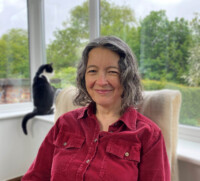My Approach
I’d like to help you to understand yourself better, make links between your past and present, and spot the patterns in the way you think, feel and behave. What happens between us in therapy will tell us a lot about what happens for you out in the world – and because I’m a relational therapist, I believe we can make use of that. Working this way helps me support you to make positive changes in your life.
I like working with all kinds of people including those with unconventional lifestyles, neurodivergent people and others who feel they may not quite fit into mainstream society. I also enjoy working with people who are using other healing practices, such as breathwork.
If we work together, my first priority will be to create a safe and trusting relationship. So, I usually spend the first couple of sessions finding out more about you and what’s brought you to therapy. We’ll agree what you want to get out of therapy, and that will set the direction for our sessions.
A session will often start with talking about something that’s current for you – whether it happened recently or in the past – as well as your feelings and thoughts about it. As we talk, I’ll also ask you to notice what’s happening in your body; it holds feelings and memories, so it can be an important source of information for us. By exploring together and making links between past and present, we can create a different understanding of your life and open possibilities for change.
About Me
I’m a UKCP-registered psychotherapist offering short- and long-term therapy for adults in Leeds.
I became a psychotherapist because having therapy changed my life and made me want to help other people in the same way.
I've completed a four-year post-graduate diploma in Relational Integrative Psychotherapy at Scarborough Counselling and Psychotherapy Training Institute and continue learning and developing through further training and supervision.
Previously, I worked as a manager at a charity providing counselling for marginalised women and have also worked in inner-city communities, with homeless people, and people who have mental health problems. I’ve spent most of my life working with people, and have always been interested in how we’re affected by our experiences — as children and as adults — and what support we all need to live happier and more meaningful lives.
I work with
- Individuals
Types of Therapies Offered
- Integrative Psychotherapist


